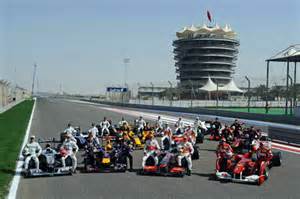
About 10,000 opposition protesters took to the streets of Bahrain on Friday to push their demands for political change two days before the Formula One Grand Prix that puts the Gulf Arab kingdom in the international spotlight.
The atmosphere was largely peaceful as groups of men, women and children carrying Bahraini flags walked down a highway and converged at a rallying point, witnesses said.
But a handful of youths in Duraz village temporarily blocked a highway with burning tyres, sending black smoke into the air.
Police cleared the tyres to allow traffic through. Wood, sticks and bricks blocked another street nearby, witnesses said.
Anti-government protesters and security forces also clashed overnight, with the demonstrators setting tyres ablaze on roads and police firing tear gas and stun grenades, the BBC reported.
Opposition activist Ala’a Shehabi told Reuters she believed violence took place in about 10 to 15 Shi’ite villages overnight but she could give no other details.
Many in the Shi’ite Muslim-majority state accuse the Sunni-led government of trying to use Sunday’s race to paper over human rights abuses and disguise political problems they say still plague the country, a close U.S. ally.
The opposition hopes the spotlight on the kingdom’s biggest sporting event will help their struggle gain wider attention.
Graffiti on the district’s walls denounced the government.
“Our blood is a sacrifice for the nation”, “Al Khalifa, we urge you to go” and “It’s my right to choose my destiny.”
A 58-year-old government employee who gave his name as Abu Mohamed said he believed the overwhelming majority of Bahrainis did not accept the Grand Prix and that the race’s economic benefits only went to a select few.
“It’s just for a few people from the ruler’s family. The money doesn’t go for the government, only for the royal family. If it was for the people, we would accept it,” he said.
Ali, a 24-year-old engineer who did not want to give his full name for fear of endangering his job prospects, said Bahrainis resented economic imbalances, especially expatriates who were given houses and jobs by the government.
“If you go around the villages you see very bad conditioned houses, and the original people of Bahrain are living in this.”
However, Organisers of the race said on Thursday that the sporadic protests and violent unrest across the Gulf nation do not pose a threat to the premier event in the kingdom.

Zayed Alzayani, the chairman of the Bahrain International Circuit, said measures in place this week at the circuit were no different than in the past races. Police vehicles dotted the road leading to the circuit and there were several checkpoints before the track.
He insisted that Sunday’s race, which is the biggest event in the Gulf nation and generates as much as $220 million, is a unifying force in the country and that the majority of Bahrainis were backing it. He said that ticket sales were up 20% over last year with 25,000 fans expected at the race.




